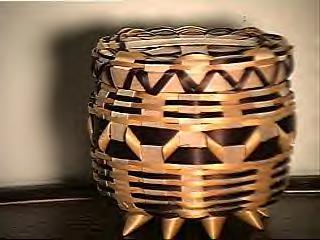|
'It's my culture and it would be good if I can pass it on to my
children.'
-QUINCY GARVIN
Experts say half of the 6,000 languages spoken worldwide are nearly extinct. And in
the United States, spoken languages are becoming even more endangered. Some 87 percent of the 155 languages that
remain could soon be extinct. But some groups, like Wisconsin's Ho-Chunk Indian Nation, have vowed to preserve
their heritage.
 Basket weaving is just one of the skills Quincy Garvin, 14, hopes to learn this week. She's one
of 150 young Ho-Chunk attending a youth leadership camp outside Muscoda in southwestern Wisconsin. Basket weaving is just one of the skills Quincy Garvin, 14, hopes to learn this week. She's one
of 150 young Ho-Chunk attending a youth leadership camp outside Muscoda in southwestern Wisconsin.
Students brave the rain and cold to learn beading, hide tanning, archery and more. But the real lessons of the
camp are the traditions of the tribe.
Garvin, from Black River Falls, explained, "It's my culture and it would be good if I can pass it on to my
children."
The most important aspect of that culture is the Ho-Chunk language, which is in danger of being lost.
Out of 6,000 Ho-Chunk, fewer than four percent speak their native language, and nearly all of them are tribal elders.
Gordon Thunder of the Ho-Chunk Nation explained, "You could be anybody, but if you don't speak the language,
if you don't speak the representative language, then you can hardly say that that's what you are."
Thunder is one of the Ho-Chunk spiritual leaders and the strongest proponent of the tribe's language program.
"We can describe things with feeling and express that in the words of our language, where there is no definition
or translation in English, there's no words that we can find that can express that same feeling,"
Thunder said.
 Patricia Schulz wants the tribe's sons and daughters to be able to express those feelings. So
she's dedicated her life to teaching the Ho-Chunk language. Patricia Schulz wants the tribe's sons and daughters to be able to express those feelings. So
she's dedicated her life to teaching the Ho-Chunk language.
Using a phonetic alphabet, students first learn common expressions and phrases and eventually they will be able
to carry on the tribe's oral history.
Schulz said, "I believe that no matter how, somewhere, somehow, we will teach the language. Whether it's in
a barn, under a tree, in a classroom, somewhere, somehow."
But the real struggle is making students want to learn, before it's too late.
Ho-Chunk Culture
http://ho-chunk.com/culture_history_page.htm
Ho-Chunk History
http://weba.uwgb.edu/galta/mrr/winnebag/hocunkh.htm
<+>=<+>
KOLA Information: http://users.skynet.be/kola/index.htm
KOLA Petitions: http://kola-hq.hypermart.net
KOLA Greeting Cards: http://users.skynet.be/kola/cards.htm
<+>=<+>
|
 Basket weaving is just one of the skills Quincy Garvin, 14, hopes to learn this week. She's one
of 150 young Ho-Chunk attending a youth leadership camp outside Muscoda in southwestern Wisconsin.
Basket weaving is just one of the skills Quincy Garvin, 14, hopes to learn this week. She's one
of 150 young Ho-Chunk attending a youth leadership camp outside Muscoda in southwestern Wisconsin. Patricia Schulz wants the tribe's sons and daughters to be able to express those feelings. So
she's dedicated her life to teaching the Ho-Chunk language.
Patricia Schulz wants the tribe's sons and daughters to be able to express those feelings. So
she's dedicated her life to teaching the Ho-Chunk language.